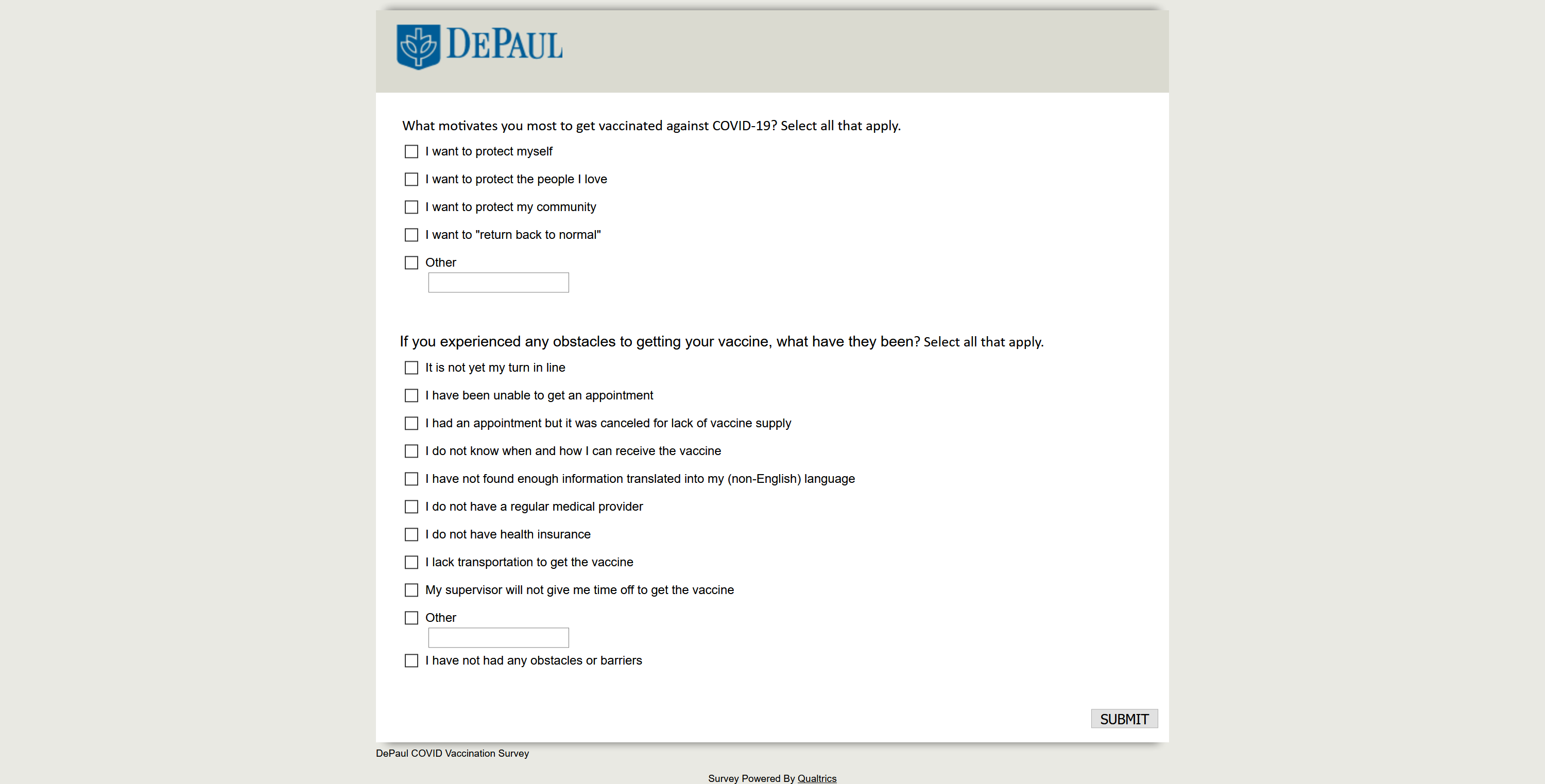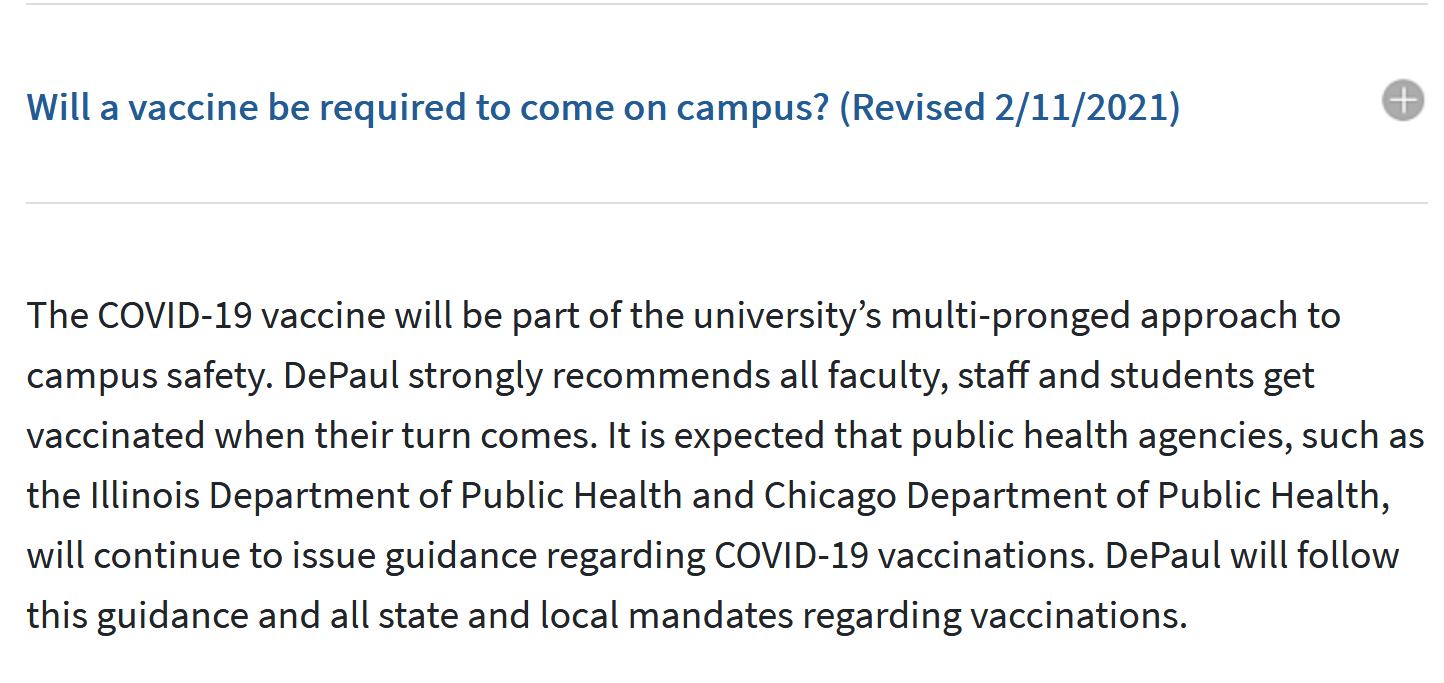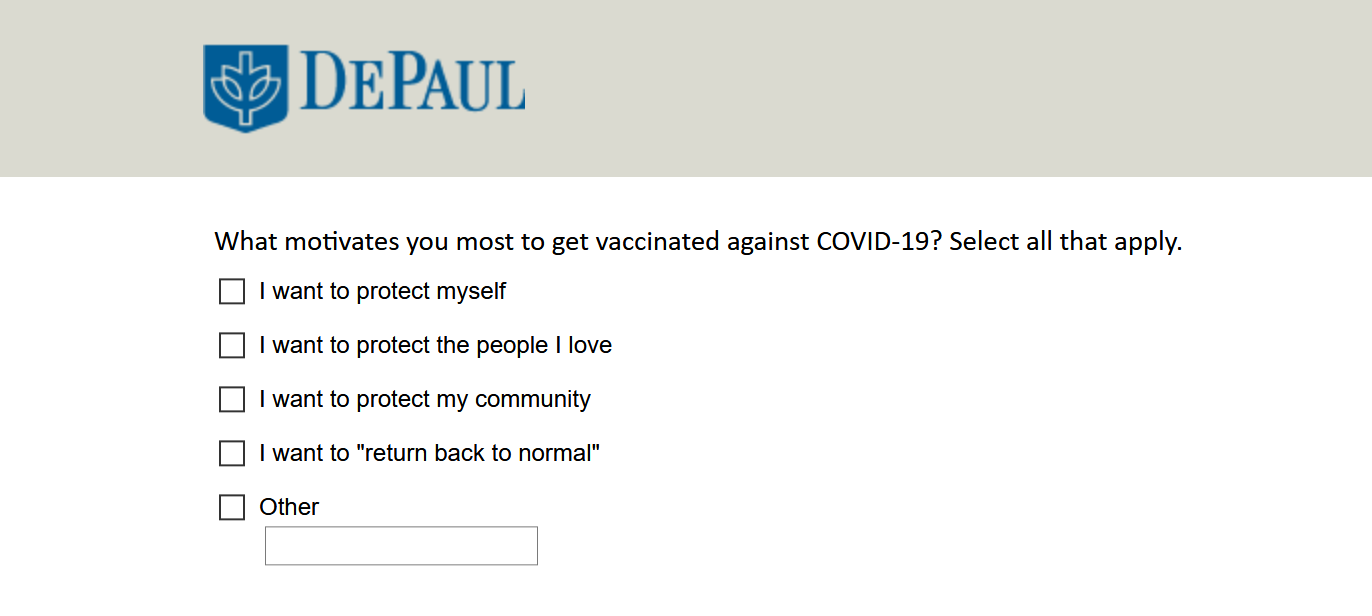Two months into distribution, the City of Chicago’s COVID-19 vaccine rollout plan could expand to include employees in higher education in phase 1c – estimated to begin March 29. However, it remains unclear whether student employees working remotely will be included in that group.
“All DePaul employees would be considered part of this group. Student employees whose work requires them to be on campus also would be included,” reads a Newsline announcement sent early Thursday morning, which stated that the university had been in discussions with the Chicago Department of Public Health regarding vaccine availability for the DePaul community.
At the moment, the city’s 1c phase does not include employees in higher education — only early education and K-12 educators. This expansion would group university employees with other essential workers and Chicagoans ages 16-64 with underlying medical conditions.
Currently, some DePaul employees are eligible for the vaccine under the city’s 1b phase, and “DePaul is reaching out to these employees and providing them with information on how they can be vaccinated,” according to Newsline. DePaul employees could be eligible under 1b if they work in other fields that fall under the “frontline essential workers” designation, like working in daycare or early education, at a grocery store or in residential settings with outbreaks. Employees over the age of 65 are also eligible under Phase 1b, after Governor J.B. Pritzker lowered the age from 75 to 65 in early January.
The email also stated that the city is projecting a move into Phase 1c on or by March 29, which would be two days after the start of Spring Quarter classes. This comes as city and Cook County officials decided to halt the state’s plans to expand Phase 1b eligibility to include those with preexisting conditions, citing a lack of vaccines to distribute.
“We recognize the Governor must make tough choices and consider needs across this diverse state, but given the limited supply of vaccine, we must also make the tough choices as the leaders of the most populous city and county in the state,” said Mayor Lori Lightfoot and Cook County Board President Toni Preckwinkle in a joint statement on Thursday. “We look forward to expanding eligibility as vaccine supply improves.”
Dr. Allison Arwady, the city’s public health commissioner, said in a press conference on Tuesday that, due to the lack of supply, moving into Phase 1c by March 29 may not even be a possibility.
“If we don’t get significantly more vaccine like we’re anticipating, it’s possible we may have to push the date for 1c back, but at this point, we’re going with the projections,” said Arwady.
As of February 11, a total of 313,610 vaccines have been distributed throughout the city since the start of vaccinations, with the highest concentration centering around the Loop. Lincoln Park and Lakeview, where DePaul students tend to flock to most, also have some of the most doses distributed. Overall, Chicago has vaccinated 8.8% of its total population, though only 76,530 people, or 2.8%, have received both vaccine doses.
A second email was sent out to all DePaul employees at 1:20 p.m that included a survey to gauge employees’ vaccination plans and collect demographic information. “The purposes of the survey are to understand DePaul employees’ vaccine plans, help to quantify vaccines needed, and help DePaul educate and inform the campus community,” read the email.

One of the pages of a survey sent to DePaul faculty, staff and student employees by the university on early Tuesday afternoon.
“As a university, we had been asking CDPH for a determination of the phase in which faculty and staff fell in the vaccine allocation program and we finally got a response,” said DePaul health sciences professor Dr. Craig Klugman in an email to 14 East on Thursday afternoon. “DePaul is an urban school which means the decisions we make not only affect the campus but also affect our surrounding neighborhoods. If everyone lived on campus and we were in a rural area, we could make decisions just for campus, but that’s not our reality.”
14 East contacted the Chicago Department of Public Health multiple times and did not receive a response regarding the discussions between the university and the city by the publication of this piece.
Klugman said that although he personally felt “relief in knowing that I had a place in line, even if it is a long way down the line,” when he heard the announcement, he doesn’t expect that employees and, potentially, student employees, being vaccinated will change much in the coming months.
“I truly think DePaul has been exemplary in making decisions based on science,” Klugman said in the email. “Do we all want to get back to normal? Most people do, of course. But we can only do that when we can gather safely. Even once we have achieved the desired 85 percent of people being vaccinated, we are seeing the virus mutate which means we will have to take regular boosters – maybe every year. So it will be a while before we can be back to normal.”
In a statement released on January 21, when Chicago was still in phase 1a, DePaul Community Health estimated that “most of the DePaul community” would not be able to access vaccinations until May 31, well into Phase 1c or even Phase 2.
As it stands, DePaul has received guidance from the city that faculty (like professors and deans) and staff (like department staff and operations) will become eligible for the vaccine under the changes to Phase 1c’s definition of an essential worker. With student employees, vaccine eligibility becomes less clear.
“The more people in our community that can get hold of the vaccine, the better.”
In an email to 14 East, DePaul spokesperson Kristin Mathews stressed that there were still “a lot of unknowns” regarding the status of eligibility for student employees. While the original email to the DePaul community stated that all DePaul employees would be eligible, it also distinctly singled out student employees who work on campus as an included demographic within Phase 1c.
“The upcoming Phase 1c is expected to include all university employees whose work requires them to be on campus,” Mathews wrote in a statement on Friday. “We expect further clarification from the city as more supplies become available and we get close to phase 1c, especially as it pertains to student employees.”
There is still no clarification yet from the university, nor from CDPH, about whether remote student employees would be eligible to receive a vaccine under the revised standard.
“DePaul does not decide who is in each phase, the city does,” Mathews added.
Student Government Association (SGA) President Alyssa Isberto said that although at the time of publication, SGA had not discussed this announcement specifically as a general body, she would advocate for all student employees to be eligible in the 1c phase expansion.
“I don’t think it would be fair to make distinctions between student workers, whether or not their job requires them to be on campus,” Isberto said in an email to 14 East Thursday afternoon. “Also, the more people in our community that can get hold of the vaccine, the better.”
Isberto also noted that SGA is advocating for DePaul to require vaccines for all students and faculty as a part of a safe return to campus.
“What I have heard back regarding this is that DePaul is working closely with the Chicago Department of Public Health and hopes to offer vaccinations to DePaul and the local community along with a number of other agencies,” Isberto said.
Currently, the Pfizer and Moderna vaccines have emergency use authorization from the FDA, which means that the university cannot legally require individuals to take the vaccine. However, once the vaccine receives full, regular approval from the FDA, “SGA is ready to fully advocate making it a requirement in order to ensure a safe return to campus,” Isberto said in the email.
Mathews indicated that vaccines would not be required by the university for a return to campus, pointing to a university FAQ on vaccines that says the vaccine “will be part of the university’s multi-pronged approach to campus safety,” and that when community members become eligible, the university “strongly recommends” they receive the vaccine.

The FAQ also indicates that students who live in Chicago, regardless of their employment status, are expected to become eligible in phase 2.
Taylor Hartley, a junior studying applied diplomacy, works two jobs at DePaul: as a crew member at the Student Center and campus tour guide for the Office of Undergraduate Admissions. As a student employee who works on campus, she was “so excited” about the news.
“I was gleeful when the news broke,” Hartley wrote in an email. “As a student employee, it makes me feel appreciated. I am going to work at my two in-person jobs currently and even though masking is required, it can be frightening to think about how much exposure [there might be]. It makes me feel safer and more humanized knowing DePaul is eligible.”
Though despite being eligible due to her employment status, Hartley added that receiving a vaccine would make her feel guilty.
“As a person, I feel guilt about the rollout. I’m a healthy, young woman. My parents back home in Missouri want to get vaccinated and I’d feel guilty if I got vaccinated due to my job before them,” wrote Hartley. “I’d feel guilty as a student employee getting vaccinated before a student with a preexisting condition. Ideally, students would be vaccinated sooner, but I understand waiting your turn.”
“As a student employee, it makes me feel appreciated.”
Senior Kim Goodrich, who works at the Student Center as an information desk attendant, echoed Hartley’s sentiments.
“Receiving the vaccine would be a huge weight off my shoulders. I work two jobs to pay my rent and other bills but neither of them transfer very well to remote work so I’ve been working in person throughout most of the pandemic,” wrote Goodrich in an email to 14 East. “I’ve had asthma since I was little…so it would be a massive relief to not have to worry so much about ending up severely ill with COVID-19.”
Despite her initial relief, Goodrich also expressed confusion regarding the next phase of vaccine distribution on college campuses. Particularly, she felt that members of the DePaul community, regardless of their position within the university, should be prioritized based on their in-person needs.
“It doesn’t make sense to me that faculty and staff who have been able to work remotely are able to receive the vaccine before students who have also been taking classes remotely,” said Goodrich. “Given that most of DePaul’s spring quarter classes are online, I think vaccination should be a priority for only those students/faculty/staff who have to go to classes/work in person.”
Though Dr. Klugman expressed similar concerns regarding individuals deemed necessary for on-campus work, he also disagreed with Goodrich, emphasizing that faculty and staff are more likely to fall within the high-risk categories than their students, and in some cases they should be prioritized.
“The vaccine allocation program is based on two major factors: (1) What populations are most likely to die from COVID-19 and (2) What populations are in work environments that make them most likely to be infected by COVID-19,” he wrote. “The first are mainly people over age 75 and with serious health conditions. The second tend to be people who are poorer and people of color who cannot work from home and whose jobs make it possible for everyone else to work and study from home.”
“A large portion of students do not fall into either category. Faculty and staff are at far greater risk of having severe illness and death from COVID-19 infection than students are. I agree with the current CDC recommendations, which are the ones that Chicago has adopted.”
In the meantime, Goodrich and Hartley both feel that DePaul could do more in terms of supporting its on-campus student employees during the pandemic.
“In one of my in-person positions, they recently talked about going back to work and safety precautions were not mentioned,” Hartley explained. “Having clear safety precautions would be really helpful. It would be impossible, but Campus Clear is so easy to lie on. If there was a more comprehensive and secure way of ensuring people were not ‘risky’ I would feel better interacting with them.”
This app is what’s next for back-to-school for DePaul and so many other universities utilizing this technology. Here’s what you’ll have to do if you want to be on campus: pic.twitter.com/hf4W2vAsTU
— Cam Rodriguez (@journo_cam) August 14, 2020
CampusClear, the app that DePaul rolled out prior to Fall Quarter last year, is an imperfect indicator of COVID-19 risk for the university and students alike. The app requires a login through Campus Connect and a quick survey about the user’s symptoms that theoretically could be faked, leading to a result that would allow for a student to enter campus buildings without actually being eligible.
Goodrich agreed. “DePaul’s administration could be doing a better job of making sure students are keeping their social circles small and enforcing social distancing and mask-wearing on-campus,” she said. “I know a lot of freshmen living on-campus want the traditional college experience but it’s just not possible right now.”
Ultimately, while the DePaul community waits for the full details regarding vaccine eligibility from administration and the Chicago Department of Public Health, Dr. Klugman stresses that we have to keep one thing in mind: patience.
“What we can do is take the vaccine when it is our turn. And we will have to take precautions in classrooms for a while even after we are teaching a lot of classes in person,” he wrote. “This won’t be like flipping a switch, it’s going to be like digging out your car in a snowstorm—it will go slowly, more snow will fall on us, we’ll have to take breaks to see where we are, and eventually we’ll get there.”
Justin Myers contributed reporting to this piece.
Header image by Cam Rodriguez.




ACP - 2021 COVID-19 Coverage finalists
12 October
[…] “Vaccine Phase 1C “Projected” to Include Most, But Not All, University Employees”Cam Rodriguez, Claire Malon, Francesca Mathewes14 EastDePaul UniversityChicago, Illinois […]
Region 5 Blog » Blog Archive » 2022 Region 5 Mark of Excellence Awards | A Society of Professional Journalists Blog
1 June
[…] Cam Rodriguez, Claire Malon and Francesca Mathewes, “Vaccine phase 1C ‘projected’ to include most, but not all, University employees,” DePaul University // 14 […]